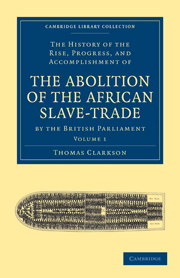Book contents
Summary
By this time the nature of the Slave-trade had, in consequence of the labours of the committee and of their several correspondents, become generally known throughout the kingdom. It had excited a general attention, and there was among people a general feeling in behalf of the wrongs of Africa. This feeling had also, as may be collected from what has been already mentioned, broken out into language: for not only had the traffic become the general subject of conversation, but public meetings had taken place, in which it had been discussed, and of which the result was, that an application to parliament had been resolved upon in many places concerning it. By the middle of February not fewer than thirty-five petitions had been delivered to the commons, and it was known that others were on their way to the same house.
This ferment in the public mind, which had shown itself in the public prints even before the petitions had been resolved upon, had excited the attention of government. To coincide with the wishes of the people on this subject, appeared to those in authority to be a desirable thing. To abolish the trade, replece as it was with misery, was desirable also: but it was so connected with the interest of individuals, and so interwoven with the commerce and revenue of the country, that an hasty abolition of it without a previous inquiry appeared to them to be likely to be productive of as much misery as good.
- Type
- Chapter
- Information
- The History of the Rise, Progress, and Accomplishment of the Abolition of the African Slave-Trade by the British Parliament , pp. 469 - 526Publisher: Cambridge University PressPrint publication year: 2010First published in: 1808

